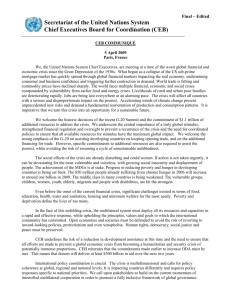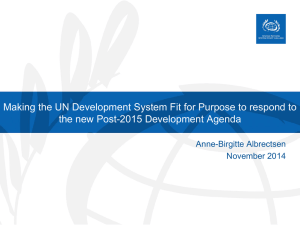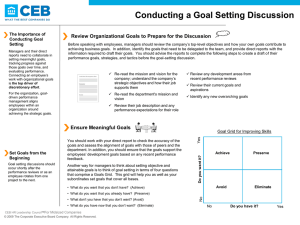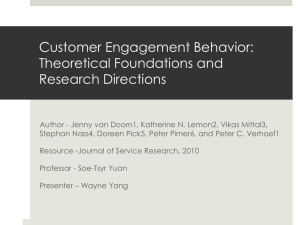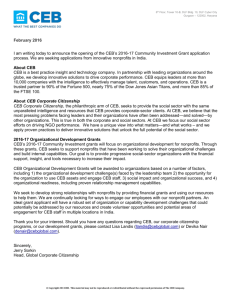Master of Science in Clinical Epidemiology and Biostatistics
advertisement
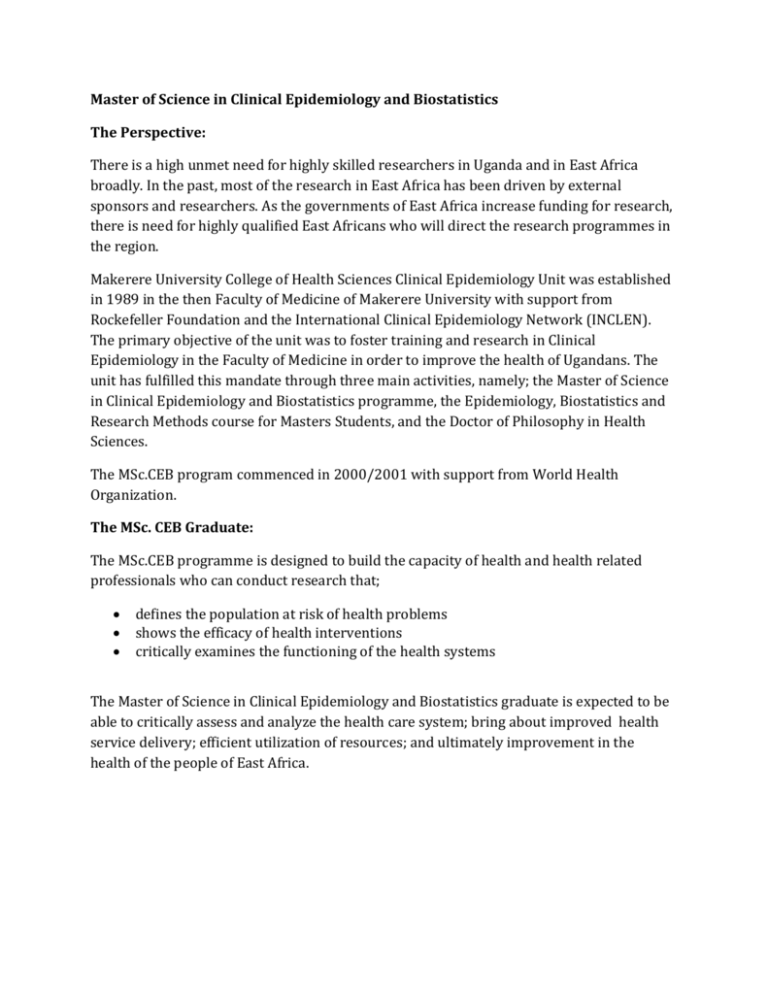
Master of Science in Clinical Epidemiology and Biostatistics The Perspective: There is a high unmet need for highly skilled researchers in Uganda and in East Africa broadly. In the past, most of the research in East Africa has been driven by external sponsors and researchers. As the governments of East Africa increase funding for research, there is need for highly qualified East Africans who will direct the research programmes in the region. Makerere University College of Health Sciences Clinical Epidemiology Unit was established in 1989 in the then Faculty of Medicine of Makerere University with support from Rockefeller Foundation and the International Clinical Epidemiology Network (INCLEN). The primary objective of the unit was to foster training and research in Clinical Epidemiology in the Faculty of Medicine in order to improve the health of Ugandans. The unit has fulfilled this mandate through three main activities, namely; the Master of Science in Clinical Epidemiology and Biostatistics programme, the Epidemiology, Biostatistics and Research Methods course for Masters Students, and the Doctor of Philosophy in Health Sciences. The MSc.CEB program commenced in 2000/2001 with support from World Health Organization. The MSc. CEB Graduate: The MSc.CEB programme is designed to build the capacity of health and health related professionals who can conduct research that; defines the population at risk of health problems shows the efficacy of health interventions critically examines the functioning of the health systems The Master of Science in Clinical Epidemiology and Biostatistics graduate is expected to be able to critically assess and analyze the health care system; bring about improved health service delivery; efficient utilization of resources; and ultimately improvement in the health of the people of East Africa. The MSc.CEB program is designed to produce graduates able to demonstrate competency at Master’s level in: Leadership and management in health research. Teaching and learning of health research in higher institutions. Formulation of evidence-based health policies. Research and development in the health sector. Safeguarding the rights, safety and wellbeing of research participants and the scientific integrity of data. Admission Requirements: The Master of Science in Clinical Epidemiology and Biostatistics programme is open to all competent candidates with a good first degree (CGPA 3.60 and above; OR Upper Second and above) from a recognised university or institution in any of the following: Health Sciences e.g. medicine, Nursing, Pharmacy, Dentistry, etc. Nutrition Sciences Veterinary Sciences Social Sciences (e.g. Social Work, Sociology, Economics, Demography) Statistics Application Procedure: All applicants for postgraduate diplomas and higher degrees have to satisfy the requirements of the relevant courses and University regulations. Application forms may be obtained from the School of Postgraduate studies after payment of an application fee at the Stanbic Bank, Makerere University Branch. Applicants should contact the Director, School of Graduate Studies for application forms. Unless otherwise stated, all applications are made in March and April of each academic year. The closing date for receiving applications is normally 30th April of the year in which admission is sought. All completed application forms must be accompanied by relevant copies of certificates and certified copies of academic transcripts. Forms, which are not completed properly, cause delays in processing of applications. Program Duration: The duration of the MSc.CEB programme is two years and includes four semesters and one recess term. Each semester is 17 weeks and the recess term is 10 weeks. There is a break of 4 weeks between semesters. Program Structure: The Master of Science in Clinical Epidemiology and Biostatistics programme has a maximum capacity of 20 students and a minimum capacity of 6 students per year. The Master of Science (Clinical Epidemiology and Biostatistics) is offered by Course work and Dissertation. All the courses in the MSc.CEB programme are core courses. There are no elective courses. Course Load: The course work shall be conducted on the Credit Unit (CU) basis. One Credit Unit shall be equivalent to one contact hour per week over a semester or a series of 15 contact hours. One contact hour is equivalent to one hour of lecture or two hours of tutorial or practical. Total Course Units required at the end of the Semester II of Year II =11 Total Course Units required at the end of the MSc CEB programme =64 Course Outline Year One, Semester I Core Courses LH TH PH CH CU CEB 7121 Principles of Epidemiology 12 24 72 60 4 CEB 7122 Clinical Epidemiology 10 20 20 30 2 CEB 7123 Principles of Biostatistics 15 30 60 60 4 CEB 7124 Observational Studies 10 20 50 45 3 CEB 7125 Clinical Trials 10 20 Total Course Units required at the end of First Semester of Year One 50 45 = 16 3 Year 1, Semester II Core Courses LH TH PH CH CU CEB 7221 Computer Skills and Data Management 10 20 50 45 3 CEB 7222 Epidemiological Analysis 15 30 60 60 4 CEB 7223 Regression Analysis 15 30 60 60 4 CEB 7224 Health Economics 10 20 50 45 3 CEB 7225 Principles of Qualitative Research 10 20 20 30 2 = 16 Total Course Units required at the end of the Second Semester of Year One Year One, Recess Term Core Course CEB 7322 Practical Health Research LH TH PH CH CU 2 12 134 75 5 = 5 Total Course Units required at the end of the Recess Term Total Course Units required at the end of the First Year = 37 NOTE: LH = Lecture hours per Semester TH = Tutorial hours per Semester PH = Practical hours per Semester CH = Contact hours per Semester CU = Credit Units Year Two, Semester I Core Courses LH TH PH CH CU CEB 8121 Designing Health Research 10 20 80 60 4 CEB 8122 Bioethics and Good Clinical Practice 10 20 50 45 3 CEB 8123 Analysis of Survival and Longitudinal Data 10 20 50 45 3 CEB 8124 Public Health and Preventive Medicine 10 20 50 45 3 CEB 8125 Management of Health Services and Research 10 20 50 45 3 = 16 Total Course Units required at the end of the First Semester of Year Two Year Two, Semester II Core Courses CEB 8221 Dissertation (fieldwork, report, defence) 10 30 100 75 5 CEB 8222 Scientific writing and dissemination 10 30 100 75 3 CEB 8223 Grants writing and management 10 30 100 75 3 Total Course Units required at the end of the Second Semester of Year Two = 11 Total Course Units required at the end of the MSc CEB programme = 64 Assessment Progressive course work assessment consists of at least two assignments per course per semester contributing up to 40% towards the final mark in each course. Final examinations are written in 15 courses in the programme. The final examinations accounts for 60% and course work 40% of the final mark in each course. The pass grade is grade point average of 3.0. All candidates registered for the MSc.CEB programme must be subjected to Viva Voce examination in order to assess the candidate’s in-depth knowledge of his/her research and attach ownership to the dissertation or thesis. Teaching and Learning Resources: Audio Visual facilities are available Essential textbooks Books and journals are accessed from relevant departments and Sir Albert Cook Medical Library. Internet access is available through Makerere University. Fees and Finances: UGX 3,700,000 per year Please Note: 1. Application fees are paid at the time of collection of application forms 2. University fees (i.e. Registration, Administration, and Library, Examination, and Tuition fees) must be paid to the University before registration. 3. Graduation, Certificate, Convocation and Academic Transcript fees are paid on completion of the course. 4. University fees may be paid in form of cash or Bank draft to Makerere University Council. 5. Non-Ugandans may pay fees in US Dollar equivalent to Uganda Shillings. 6. The student may be government sponsored, Aid agency sponsored or selfsponsored. 7. Other requirements like books, stationary & materials, accommodation, food, research expenses, etc; the sponsor should pay directly to the Student 8. The funds for research are paid to the student at the beginning of the research Project. Employment Opportunities:
